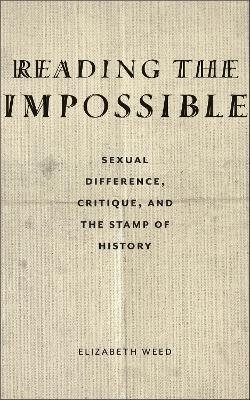
Reading the Impossible
Sexual Difference, Critique, and the Stamp of History
Seiten
2024
Fordham University Press (Verlag)
978-1-5315-0678-0 (ISBN)
Fordham University Press (Verlag)
978-1-5315-0678-0 (ISBN)
In reconsidering the question of sexual difference, Weed offers a fresh perspective on what is at stake for critical reading in the neoliberal university.
Reading the impossible has never seemed less possible. A few decades ago, critical readings could view the collapse of foundationalism optimistically. With meaning no longer soldered onto being, there was hope for all those beings whose meaning had been forever ordained by Nature or the Divine. Critical reading thus became a way of exploring the devious workings of knowledge and power. But as non-foundational systems of meaning have proven to be so perfectly suited to the transactional logics of the market, reading for the impasses of meaning has come to be seen as quixotic, impractical, and dated.
To concur with that view, Elizabeth Weed argues, is to embrace the fantasy told by the neoliberal order. To read the impossible is to disrupt that fantasy, with its return to stable categories of marketable identity, in order to contest the inexorable workings of misogyny and racism. This book seeks to disturb the positivity of identity in the hope of retrieving the impossibility of sexual difference, an impossibility that has its effects in the Real of misogyny.
A return to the famous debate between Derrida and Lacan on the impossibility of sexual difference yields two different readings of the impossible. In reconsidering these questions, Weed shows how the practice of reading can powerfully stage the wiles of language and the unconscious. In returning to that earlier moment in the context of current debates on the role of reading and interpretation, Weed offers a fresh perspective on what is at stake for critical reading in the neoliberal university.
Reading the impossible has never seemed less possible. A few decades ago, critical readings could view the collapse of foundationalism optimistically. With meaning no longer soldered onto being, there was hope for all those beings whose meaning had been forever ordained by Nature or the Divine. Critical reading thus became a way of exploring the devious workings of knowledge and power. But as non-foundational systems of meaning have proven to be so perfectly suited to the transactional logics of the market, reading for the impasses of meaning has come to be seen as quixotic, impractical, and dated.
To concur with that view, Elizabeth Weed argues, is to embrace the fantasy told by the neoliberal order. To read the impossible is to disrupt that fantasy, with its return to stable categories of marketable identity, in order to contest the inexorable workings of misogyny and racism. This book seeks to disturb the positivity of identity in the hope of retrieving the impossibility of sexual difference, an impossibility that has its effects in the Real of misogyny.
A return to the famous debate between Derrida and Lacan on the impossibility of sexual difference yields two different readings of the impossible. In reconsidering these questions, Weed shows how the practice of reading can powerfully stage the wiles of language and the unconscious. In returning to that earlier moment in the context of current debates on the role of reading and interpretation, Weed offers a fresh perspective on what is at stake for critical reading in the neoliberal university.
Elizabeth Weed is Director Emerita of the Pembroke Center for Teaching and Research on Women at Brown University and editor of differences: A Journal of Feminist Cultural Studies.
Prologue: Why read the impossible now? | 1
1. States of Impasse | 30
2. Reading Sexual Difference | 42
3. Reading the Stamp of History | 89
4. Reading the Feminist Impossible | 120
Coda | 125
Acknowledgments | 131
Notes | 133
Bibliography | 163
Index | 175
| Erscheinungsdatum | 09.04.2024 |
|---|---|
| Verlagsort | New York |
| Sprache | englisch |
| Maße | 127 x 203 mm |
| Gewicht | 295 g |
| Themenwelt | Geisteswissenschaften ► Psychologie ► Psychoanalyse / Tiefenpsychologie |
| Geisteswissenschaften ► Sprach- / Literaturwissenschaft ► Anglistik / Amerikanistik | |
| Geisteswissenschaften ► Sprach- / Literaturwissenschaft ► Literaturwissenschaft | |
| Sozialwissenschaften ► Soziologie ► Gender Studies | |
| ISBN-10 | 1-5315-0678-X / 153150678X |
| ISBN-13 | 978-1-5315-0678-0 / 9781531506780 |
| Zustand | Neuware |
| Informationen gemäß Produktsicherheitsverordnung (GPSR) | |
| Haben Sie eine Frage zum Produkt? |
Mehr entdecken
aus dem Bereich
aus dem Bereich
vom Mythos zur Psychoanalyse des Selbst
Buch | Softcover (2023)
Kohlhammer (Verlag)
28,00 €
Grundlagen, Behandlungstechnik und Anwendung
Buch | Softcover (2022)
Kohlhammer (Verlag)
35,00 €
Buch | Softcover (2022)
Kohlhammer (Verlag)
34,00 €


